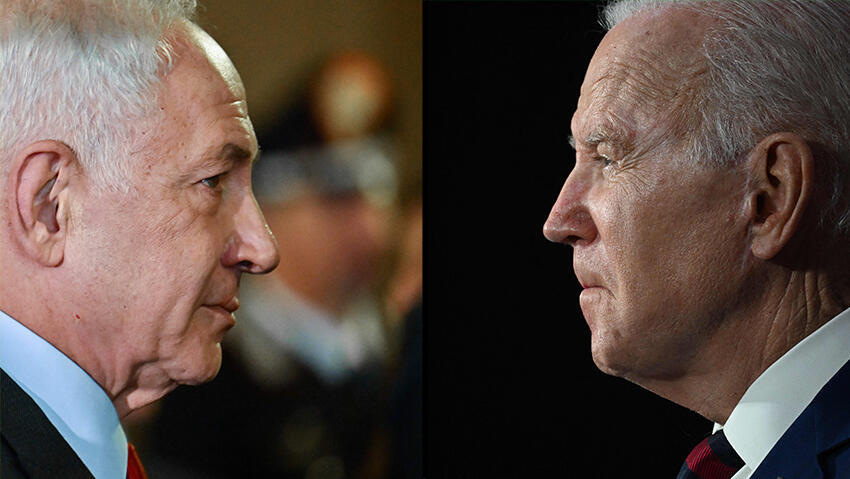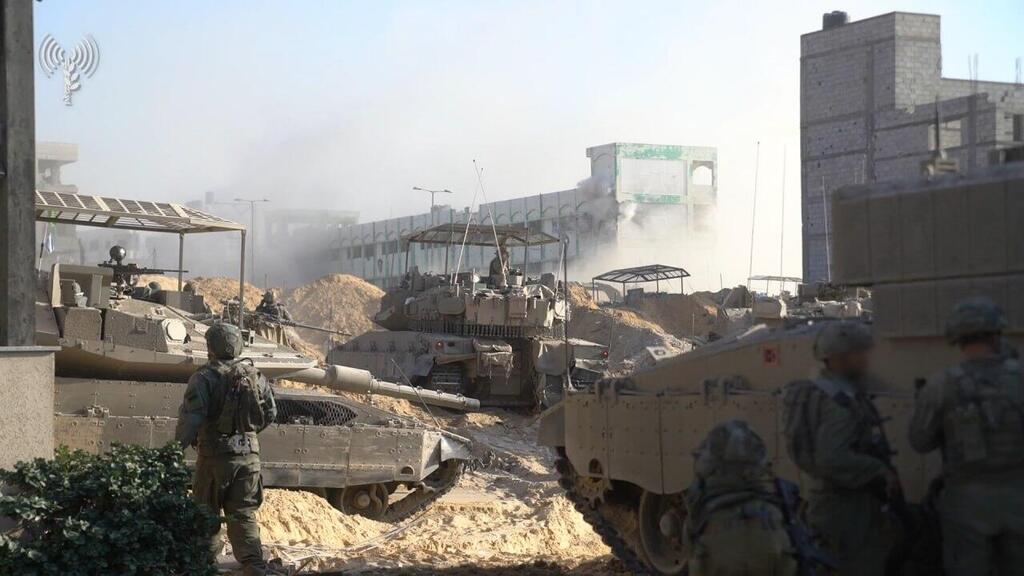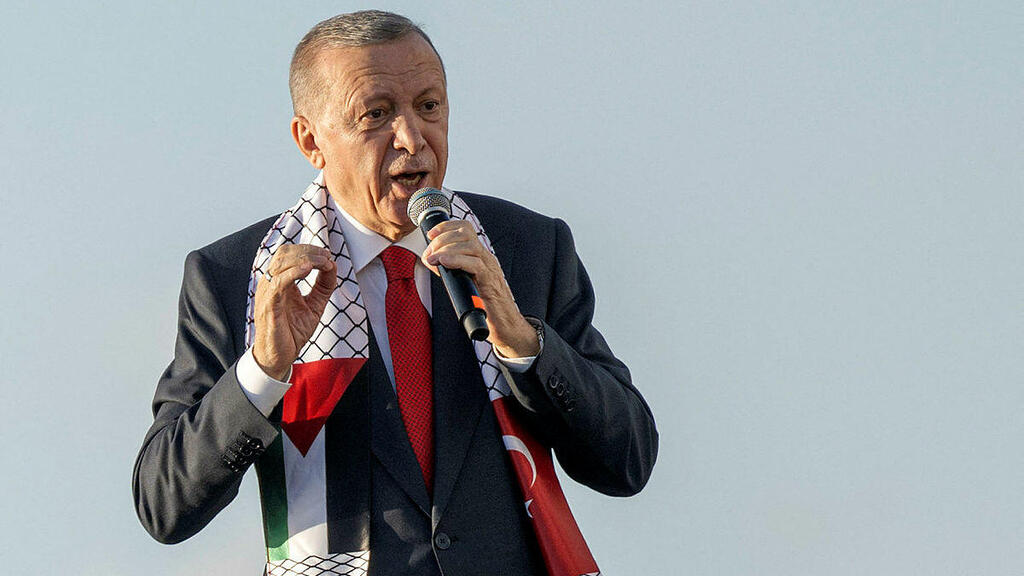Getting your Trinity Audio player ready...
At the beginning of the fifth week of the Swords of Iron war, it becomes clear that besides the fighting in the south, in the north, in the West Bank and further away with Iraq and Yemen, Israel is facing a sixth front, which may determine how the war will end and what will be achieved in it. This is the American front.
More stories:
On this front they don't shoot, they only talk, but if we do not conduct ourselves with intelligence and political sophistication, the Americans may also switch from words to actions and then the amount of time in which the IDF can fight to collapse Hamas militarily and politically will be greatly shortened, which will force the IDF to speed up its actions to get as much done as possible before a cease-fire is imposed. And when you rush into combat, there are many more casualties.
4 View gallery


Prime Minister Benjamin Netanyahu and US President Joe Biden are facing off on the issue of Hamas in Gaza
(Photo: AFP)
This is just one area in which the IDF and the State of Israel will be harmed if American backing is partially or completely lost. Today this seems a distant possibility, but it could materialize quickly because the administration in Washington is under pressure - both internally politically and from the countries of Europe and North America and the United Nations. If the Biden administration does not meet these pressures, Israel will be in serious trouble. This does not mean that she is obliged to surrender herself and give up her national interests, but it will require a backbone, national resilience and uncompromising political cohesion. It's not easy to say no to Uncle Sam.
The confrontation on the American front mainly stems from the way the Biden administration defined its interests. There is no doubt that the president is 100% with Israel, emotionally and practically, but the members of his administration, especially Secretary of State Antony Blinken and National Security Adviser Jake Sullivan, have other strategic goals they want to achieve besides defeating Hamas in Gaza. First and foremost, they want to achieve stability in the Middle East so that the U.S. can focus politically and militarily on winning the Russia-Ukraine war and competing with China for political and economic dominance in the global arena. A Middle East that threatens at any moment to escalate into a regional war is interfering with Washington's other conflicts that are more important to it.
The U.S. wants to restore its position in the Middle East, which it lost to China and, to a certain extent, to Russia, because of strategic errors made by presidents Barack Obama and Donald Trump vis-à-vis Iran and its proxies. At the same time, it wants to achieve a sustainable solution to the Israeli-Palestinian conflict - a long-standing obsession of American presidents since the 1980s. Such a move would remove from the Democratic government the pressure exerted on it by the progressive wing of the party, and also by a considerable part of the Republican politicians who are tired of dealing with the conflict. In this regard, the Europeans. who left for generations including in the current period, has been pressuring the U.S. to bring an end to the Israeli-Palestinian conflict because, according to the world's view, which may be correct, only the U.S. can influence Israeli governments.
Therefore, the Biden administration has set itself the goal of leveraging the current war to achieve a settlement. This is why Biden and Blinken are constantly urging the Israeli government to formulate a "plan for the day after the war in Gaza."
4 View gallery


Benjamin Netanyahu meets with US Secretary of State Antony Blinken at his office in Jerusalem
(Photo: Amos Ben Gershom/GPO)
This is a washed-up name for the American demand, which will become more in a few months, that Israel decides together with Washington how it solves not only the problem of the threat posed by Gaza, but the entire Palestinian issue. The Americans seriously intend that the settlement regarding Gaza after the war, whether Hamas collapses completely or not, will be within the framework of the "two states for two peoples" principle that will also include the West Bank.
Another interest of the U.S. is to release the hostages that Hamas, Islamic Jihad and other Gazan organizations are holding, and first and foremost the holders of American citizenship. That is why it is pressuring Israel regarding the humanitarian truces. For Hamas to show goodwill, then maybe it will be flexible about the hostages. But in Israel, for now, they believe that this concept is fundamentally wrong. In the Middle East, concessions lead to demands for more concessions.
Therefore, for now, the Israeli government led by Benjamin Netanyahu stubbornly refuses to give in to the pressure exerted by Blinken to allow humanitarian truces. The question is how long will the prime minister and the Israeli government in general be able to stand up to the pressures which for now are persuasive efforts, but may take on a more practical nature. For example, slowing down or stopping some of the military aid that the U.S. provides to Israel or softening the backing it gives at the UN.
What progressives don't understand
The Americans are, of course, also fighting for Israel. First on the front of international legitimacy, where they give it important capabilities that enable the IDF to fight on all fronts. This is mainly about the time needed to complete the mission without rushing and without suffering losses as a result of quick and ill-considered action. Security from demanding that Israel agree to a cease-fire that would save Hamas. And they also provide military aid, mainly sophisticated weaponry, vehicles and combat equipment that gives the IDF breathing space and flexibility in the use of force.
What is no less important, the Americans closed for us the lack of deterrence that opened up due to the political crisis and the attempted coup d'état of the government. The U.S. sent two task forces around aircraft carriers to the Middle East, and these completed the deterrence that had eroded toward what is known in the IDF as the "third circle countries" - Iran and its proxies in Yemen and Iraq. In return, Biden administration officials demand four things:
A. That Israel will allow the increase of humanitarian aid to the Gaza Strip, including fuel.
B. Humanitarian pauses. Washington adopted the reasoning of the prime minister of Qatar, who convinced Blinken that the truces would help convince Hamas to release hostages.
C. The administration wants Israel to formulate an arrangement for "the day after," including a solution to the Israeli-Palestinian conflict, right now.
D. The most important demand from the point of view of the Americans: that Israel does not act in a way that causes mass killings among civilians in the Gaza Strip, and will lead to an explanatory disaster and severe and immediate damage to legitimacy.
The decision-makers in Washington are fundamentally wrong in their approach to the Middle East. They estimate that the U.S. will restore its position in the region through gestures, some of which are of goodwill and some of which are actually military signals intended to deter the Iranians and their emissaries. In Washington, in the Democratic government, which is fundamentally progressive, they still do not understand, despite all the think tanks that operate there, that here in the Middle East power almost exclusively moves things.
Refusing is also an option
The Americans refuse to understand that the moderate Arab regimes, including the Maghreb, or Western and central North African countries (but not Turkey and Qatar, which are affiliated with the Muslim Brotherhood), want Israel to wipe Hamas off the face of the earth. Not because they became Zionists, but because the Islamist-Jihadist organization endangers their survival no less than ISIS. At the top of the death list of Hamas and Islamic Jihad are Egyptian President Abdel Fattah al-Sisi, Palestinian Authority Chairman Mahmoud Abbas and King Abdullah of Jordan. The danger they face from Hamas and Islamic Jihad is no less than that faced by the residents of southern Israel. But in Washington, they take seriously the double tongue of the leaders of the Gulf, Egypt and the Palestinian Authority, and think that if they bring Israel to a truce in the fighting (allowing Hamas to reorganize), it will improve the popularity and political standing of the U.S. as a power in the region.
In Israel, for the time being, they are doing quite well on the American front. The government refuses to grant the Gazans humanitarian respite without receiving real payback on the issue of the hostages. In the meantime, Israel is not ready to introduce fuel into the Strip that will power Hamas' generators and allow them to remain in the terror tunnels for a long time, and are trying very hard to avoid harming non-involved civilians and allow them to flee to shelter areas in the south of the Strip.
In Israel, they have also established think tanks on the issue of the day after, although it is clear that the thinking carried out in the spirit of the current government will only deepen the dispute with the Americans, who seriously intend for Gaza to be the beginning of the "two states for two peoples" process. The right-wing government sees this solution as an abominable arrangement that must not be agreed to.
The war on the American front has only just begun and it can be estimated that it will intensify. It will not be enough to increase information efforts in the U.S. and the West. The Israeli government will be required to make difficult decisions, including an explicit refusal to accept American demands that mean the cessation of hostilities before the elimination of Hamas as a military and political force in the Gaza Strip and in the West Bank.
There are times when the Israeli government is forced to enter into a frontal confrontation with its largest and most important ally. This happens when its true national interests are at stake. Israel should refuse the demands of the administration in Washington that would bring an end to the war in an arrangement that is less than the complete defeat of Hamas – militarily and politically, as well as physically. This has already happened in the past, and the governments of Ben Gurion and Levi Eshkol stood the test with honor. In addition, it is worth remembering that the Americans also know how to respect power, and if the IDF wins they will rush, like everyone else, to take credit and forget some of their claims.




